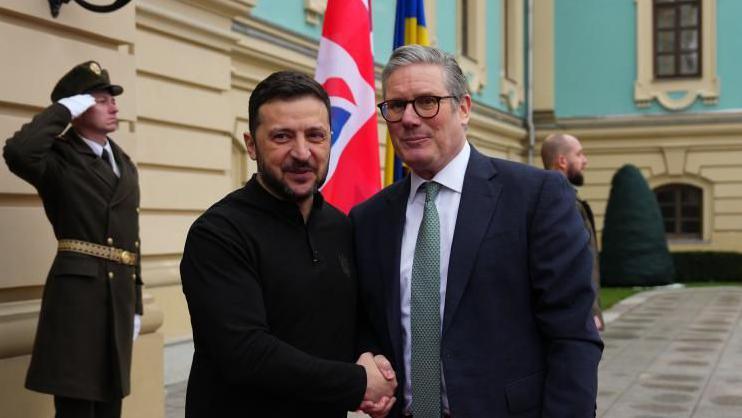PM 'ready' to put troops on ground in Ukraine to protect peace

Volodymyr Zelensky and Sir Keir Starmer in Kyiv in January
- Published
Sir Keir Starmer has said he is "ready and willing" to put UK troops on the ground in Ukraine to help guarantee its security as part of a peace deal.
The UK prime minister said securing a lasting peace in Ukraine was "essential if we are to deter Putin from further aggression in the future".
Ahead of an emergency summit with European leaders in Paris on Monday, Sir Keir said the UK was prepared to contribute to security guarantees to Ukraine by "putting our own troops on the ground if necessary".
"I do not say that lightly," he wrote in the Daily Telegraph, external. "I feel very deeply the responsibility that comes with potentially putting British servicemen and women in harm's way."
Sir Keir added: "But any role in helping to guarantee Ukraine's security is helping to guarantee the security of our continent, and the security of this country."
The end of Russia's war with Ukraine "when it comes, cannot merely become a temporary pause before Putin attacks again", he said.
This means UK troops could be deployed alongside soldiers from other European nations alongside the border between Ukrainian-held and Russian-held territory.
Sir Keir has previously only hinted that British troops could be involved in safeguarding Ukraine after a ceasefire.
Health Secretary Wes Streeting said the government views the war in Ukraine as "the frontline for Europe and the frontline for Britain".
He told the BBC that the UK is "prepared to play its part in securing the long-term future for Ukraine, for Europe and for Britain's national security".
The prime minister's announcement comes after the former head of the Army, Lord Dannatt, told the BBC the UK military was "so run down" it could not lead any future peacekeeping mission in Ukraine.
Speaking to BBC Breakfast, he said sending troops to Ukraine would come at a "considerable cost" and require an increase in funding for the military.
"Frankly, we haven't got the numbers and we haven't got the equipment to put a large force onto the ground for an extended period of time at the present moment," he said.
Former MI6 chief Sir John Sawers also warned that any peacekeeping force sent to Ukraine after the war must have "a very clear mandate" to ensure a ceasefire agreement holds.
Sir Keir, who is due to visit President Donald Trump in Washington later this month, said a "US security guarantee is essential for a lasting peace, because only the US can deter Putin from attacking again".
He is also meeting other European leaders on Monday over concerns the US is moving forward with Russia on peace talks that will lock out the continent.
Meanwhile, US Secretary of State Marco Rubio is to meet Russian officials in Saudi Arabia in the coming days, US officials say.
On Saturday, the US special envoy to Ukraine, Keith Kellogg, said European leaders would be consulted only and not take part in any talks between the US and Russia.
A senior Ukrainian government source told the BBC on Sunday that Kyiv has not been invited to talks between the US and Russia.
Last week, Trump said he had had a lengthy conversation with Russian President Vladimir Putin, and that negotiations to stop the "ridiculous war" in Ukraine would begin "immediately".
Trump then "informed" Zelensky of his plan.
On Sunday, Trump said that he expected Zelensky to be involved in the talks. He also said he would allow European nations to buy US weapons for Ukraine.
Asked by the BBC about his timetable for an end to fighting, Trump said only that "we're working to get it done" and laid the blame for the war on the previous administration's Ukraine policies.
Writing in the Telegraph, Sir Keir said "peace cannot come at any cost" and "Ukraine must be at the table in these negotiations, because anything less would accept Putin's position that Ukraine is not a real nation".
He added: "We cannot have another situation like Afghanistan, where the US negotiated directly with the Taliban and cut out the Afghan government" - in reference to a deal negotiated in Trump's first administration, which was later enacted by the Biden administration."
"I feel sure that President Trump will want to avoid this too," said Sir Keir.
Sir Keir said Ukraine's path to Nato membership was "irreversible" and European nations "must increase our defence spending and take on a greater role" in the alliance.
The UK currently spends around 2.3% of GDP on defence and has committed to increase defence spending to a 2.5% share of the economy, without giving a timeframe for this.
Trump has called for Nato members to spend 5% of GDP on defence, while Nato secretary general Mark Rutte has suggested allies should spend more than 3%.
Lord Dannatt - who was head of the Army from 2006 to 2009 - told the BBC a rise to 2.5% would be "nowhere near enough" and would only "fill the potholes" left by current underspending.
He estimated up to 30,000 UK troops would be needed on rotation for a peacekeeping mission in Ukraine, which would likely require mobilising reservists.
Streeting told the BBC he would not speculate on the number of troops the mission would require, adding it was for the prime minister, defence secretary and foreign secretary to decide.
"But what I would say is the prime minister doesn't talk about deploying British service men and women lightly," he said.
The meeting in Paris called by French President Emmanuel Macron will see Sir Keir joined by leaders from Germany, Italy, Poland, Spain, the Netherlands and Denmark along with the presidents of the European Council and European Commission, and Rutte.